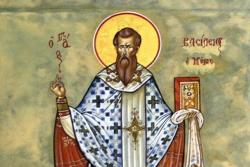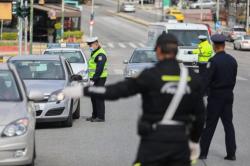New Year Traditions
 The New Year is when Greek people celebrate the arrival of Saint Basil (Agios Vassilios). Saint Basil wore Byzantine style robes and had a dark beard, unlike Santa Claus with his red fur-lined outfit, white beard, rosy cheeks and a 'jolly' large belly. Saint Basil was born in Caesarea in Cappodocia, Asia Minor, during the 4th Century and visited Greek homes at the New Year, giving his blessings. Saint Basil lived from 330 AD to 1st January 379 AD, and was a near contemporary of Saint Nicholas, who died around the year 343 AD. Many Greek families still exchange gifts on this day, despite the fact that today most now exchange gifts on Christmas Day and are more familiar with the figure of Santa Claus rather than Saint Basil, however, the tradition of this great Cappadocian saint remains alive. In return for his blessings, St Basil would receive a slice of Vassilopita, a New Year's cake named after him.
The New Year is when Greek people celebrate the arrival of Saint Basil (Agios Vassilios). Saint Basil wore Byzantine style robes and had a dark beard, unlike Santa Claus with his red fur-lined outfit, white beard, rosy cheeks and a 'jolly' large belly. Saint Basil was born in Caesarea in Cappodocia, Asia Minor, during the 4th Century and visited Greek homes at the New Year, giving his blessings. Saint Basil lived from 330 AD to 1st January 379 AD, and was a near contemporary of Saint Nicholas, who died around the year 343 AD. Many Greek families still exchange gifts on this day, despite the fact that today most now exchange gifts on Christmas Day and are more familiar with the figure of Santa Claus rather than Saint Basil, however, the tradition of this great Cappadocian saint remains alive. In return for his blessings, St Basil would receive a slice of Vassilopita, a New Year's cake named after him.
 On New Year's Day, the Vassilopita cake is cut into slices for everyone in the family and household in the following order: first for Christ, then for the Virgin Mary, Saint Basil, for the poor, the house, and then for each family member, starting from the head of the house. The Vassilopita cake is baked with a coin within it, whoever finds the coin in their slice is thought to receive blessings and good fortune throughout the whole year. Legend has it that tax collectors once overtaxed the people to the extent that they were forced to hand over all their jewellery to the authorities. Basil declared that this was unjust, and forced the tax collectors to give him the jewellery, so he could return it to the people. But it was impossible to know which items belonged to whom. So Basil came up with the idea to bake cakes containing the jewels, with each person receiving a slice of the cake, so the riches were distributed back to the people.
On New Year's Day, the Vassilopita cake is cut into slices for everyone in the family and household in the following order: first for Christ, then for the Virgin Mary, Saint Basil, for the poor, the house, and then for each family member, starting from the head of the house. The Vassilopita cake is baked with a coin within it, whoever finds the coin in their slice is thought to receive blessings and good fortune throughout the whole year. Legend has it that tax collectors once overtaxed the people to the extent that they were forced to hand over all their jewellery to the authorities. Basil declared that this was unjust, and forced the tax collectors to give him the jewellery, so he could return it to the people. But it was impossible to know which items belonged to whom. So Basil came up with the idea to bake cakes containing the jewels, with each person receiving a slice of the cake, so the riches were distributed back to the people.
Another old tradition that Greeks have followed at the New Year is called 'podariko', meaning 'good foot'. Loosely translated, this means that the person who first sets foot in your home in the New Year must be someone who brings good luck and also enter their home with the right foot first. Today, many people in Greece are very careful as to who will be the first to enter their home, usually inviting someone they believe will bring good luck to be the first to walk into their home as soon as the New Year arrives.
 For the 2021 New Year celebrations, more than 10,000 police officers will be deployed throughout the country for New Year's Eve in order to ensure compliance with the measures for preventing the spread of the novel coronavirus. The restrictions will be similar to those imposed for the Christmas holiday, but police checks will be more intensive. During this time, traffic may be interrupted and stopped on all major roads in order to check any and all vehicles without exception. In order to attend New Year parties, citizens must send a code 6 SMS to the 13033 number in order to leave their homes, and a second in order to return. Restrictions will begin at 10:00pm on New Year's Eve, with a curfew lasting until 5:00am in the morning, except for reasons of health, going to work or to walk your pets.
For the 2021 New Year celebrations, more than 10,000 police officers will be deployed throughout the country for New Year's Eve in order to ensure compliance with the measures for preventing the spread of the novel coronavirus. The restrictions will be similar to those imposed for the Christmas holiday, but police checks will be more intensive. During this time, traffic may be interrupted and stopped on all major roads in order to check any and all vehicles without exception. In order to attend New Year parties, citizens must send a code 6 SMS to the 13033 number in order to leave their homes, and a second in order to return. Restrictions will begin at 10:00pm on New Year's Eve, with a curfew lasting until 5:00am in the morning, except for reasons of health, going to work or to walk your pets.
It was announced on Saturday 2nd January that the national lockdown will now be be extended until Monday 11th January 2021, when it is planned for schools to re-open after the holiday break. All shops and businesses that were originally allowed to open for the holiday period will now be closed. This affects businesses in the retail sector, the arts, tourism, transportation services as well as bookshops, hairdressers and beauty salons. Fishing and hunting has also been banned. The daily curfew restriction will revert back to start at 9:00pm until 5:00am from Sunday 3rd January. We wish everyone a 'Happy and Healthy New Year'.